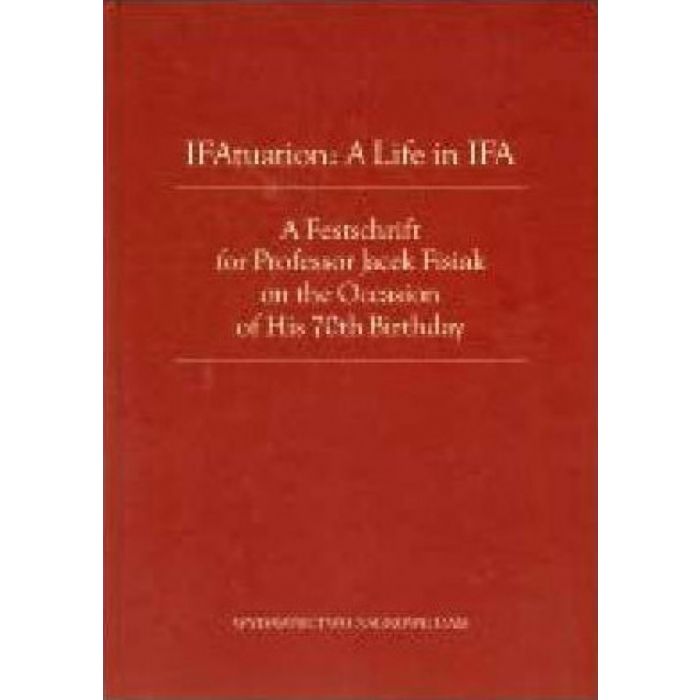IFAtuation: A Life in IFA. A Festschrift for Professor Jacek Fisiak on the Occasion of His 70th Birthday
- Dostępność: dostępny
- ISBN: 83-232-1634-7
- Kategoria: OUTLET, Filologia Angielska, Wydawnictwa Inne
- Data wydania: 2006
110,00 zł
- Preamble
Elżbieta Adamczyk and Anna Hebda- Mediaeval English assimilations revisited: The assimilations of labials
Arleta Adamska-Salaciak and Piotr Gąsiorowski- Thumbing one's farewell to muggers, lumberjacks, and women in an interesting condition: A dictionary as a Quonset hut
Paulina Ambroży- "Nature is a stranger yet": Nature and man in the poetry of Wallace Stevens and Emily Dickinson
Ryszard Bartnik- "Look back in anger": Postcolonial (re)reading of adventure novels: R. M. Ballantyne's The coral island and R. L. Stevenson's Treasure island
Anna Bogacka, Geoffrey Schwartz, Monika Potczyńska-Fiszer, Paulina Zydorowicz and Paula Orzechowska- The production and perception of schwa in second language acquisition: The case of Polish learners of English
Joanna Bugaj and Matylda Włodarczyk- At "the wylle and plesur" of "kyng and soueraine": In search of motivations for binomials as markers of legal discourse
Piotr Cegłowski and Przemysław Tajsner- Topicalisation and Object Fronting in Polish: A view from a minimalist perspective
Anna Cieślicka and Agnieszka Kujatowicz- Cross-linguistic interactions in the trilingual lexicon: Language selective or non-selective access of interlingual homographs in L3 visual word recognition?
Anatolij Dorodnych- Slang across cultures
Krystyna Droździal-Szelest and Magdalena Kębłowska- New challenges in the language teaching profession: Are we ready to face them?
Radoslaw Dylewski- On the conservative character of early American English: Evidence from verbal morphology with selected ablaut verb forms in focus
Anna Dziemianko and Robert Lew- Research into dictionary use by Polish learners of English: Some methodological considerations
Katarzyna Dziubalska-Kołaczyk, Katarzyna Janicka, Małgorzata Kid, Sylwia Scheuer, Jarosław Weckwerth, and Danitta Wolfram-Romanowska- Native standards or non-native ELF: Which English to teach in the 21st century?
Małgorzata Fabiszak and Jacek Fabiszak- Images of conflict in Shakespeare's I Henry VI: A cognitive approach
Aleksandra Górska and Joanna Śmiecińska- Subordination and coordination in spoken and written conversation: A comparative case study of a telephone conversation and an instant messaging session
Sabine Heinz- The impact of social changes on the development of the Insular Celtic languages
Dwight Holbrook- To perceive = to be perceived
Piotr Jakubowski and Ewa Ciszek- The status of w-plurals in medieval Anglo-Irish
Janusz Kaźmierczak- Culture contact in Danuta Mostwin's Ameryko! Ameryko!
Agnieszka Kiełkiewicz-Janowiak and Joanna Pawelczyk- Gender stereotypes in language use: Polish and English
Marcin Kilarski- Die Materie gegen den Geist: On 19th century German linguistic epistolography
Jerzy Koch- Poglądy i teorie na temat powstania afrikaans: Zarys historyczny i próba typologii
Marcin Krygier- Irregular adjectival gradation in Old English: The case of the mutated superlatives
Barbara Kryk-Kastovsky and Dieter Kastovsky- "Anything you can do, I can do better": A paper not so much about musicals, but about the semantics-pragmatics interface
- Joseph Kuhn
- The "Pervigilium Veneris" and modernist theory of the poetic word in the writing of Alien Tate and T.S. Eliot
Wojciech Kwarciński- Perlocutions in law
Grzegorz Michalski- Beats-and-Binding vs. Government: All roads lead to phonology
Iwona Paskal, Agnieszka Chmiel, and Andrzej Janiak- Acquisition of the simultaneous interpreting skill and its effect on the working memory processing of linguistic material
Marcin Ptaszyński- Out ye Polish jades!
Jacek Rysiewicz- FL aptitude research and testing: A survey of issues and problems
Pawel Schefler- Nominal categories in native English and EFL argumentative writing: A corpus-based analysis
Geoff Schwartz and Hanna Wysocka- The dynamics of L2 speech: Phonetic anatomy, Gestalt theory, and pronunciation teaching
Agnieszka Setecka and Joanna Maciulewicz- Pickwick's journeys and adventures: From the eighteenth century to the Victorian Aee
Teresa Siek-Piskozub and Alexandra Wach- EFL classroom research in the Polish context
Liliana Sikorska- The chastising of a bad king: The interplay of the didactic and the adventurous in Robert of Chyle
Tomasz Skirecki- Across the Tamar: Mebyon Kernow and prospects of Cornish devolution
Wlodzimierz Sobkowiak, Przemyslaw Kaszubski and Aleksandra Wojnowska- What are dictionary definitions good for?
Pawel Stachura- Retreat from the American frontier: Mythic interpretation of Cooper's "high" plots
Paulina Stęplowska and Anna Warmuz- The adventures of Reynart: Critique of the courtly and the religious cultures of the High Middle Ages in The history of Reynard the Fox.
Zdzidaw Wąsik, Elżbieta Wąsik and Maciej Kielar- Applying Victor H. Yngve's theory of human linguistics to the analysis of interpersonal relationships among communication participants in social reality and literary fiction
Bogusława Whyatt- Discovering the bilingual mind: Some evidence for the reorganisation of the mental lexicon in translation students
Marek Wilczyński- Tradition, romanticism, and the paradoxes of conservatism in antebellum New England
Jacek Witkos and Anna Dziemianko- On the syntax of idioms and the Idiomatic Constituency Axiom
Hanna Wysocka and Edward Wight- PNJA exams in IFA UAM: A critical discussion of the role and effectiveness of the examination procedure
Paweł Zajas- Postkolonialne echa z Potudniowej Afryki:Egzotyczny kostium patriotyzmu w etnografii Antoniego Rehmana (1840-1917)
Magdalena Zapędowska- "An ample word": Reading Dickinsonian desire in the twenty-first century
Wieslaw Awedyk- Squib: The psychological reality of empty nuclei
Napisz własną recenzję
| Informacje szczegółowe | |
|---|---|
| Wersja publikacji | drukowana |
| Format | 17,5 x 24,0 |
| Typ publikacji | Monografia |
| Wydanie | I |
| ISBN | 83-232-1634-7 |
| Liczba stron | 872 |
| Liczba arkuszy wydawniczych | 68,00 |
| Rodzaj oprawy | twarda |
